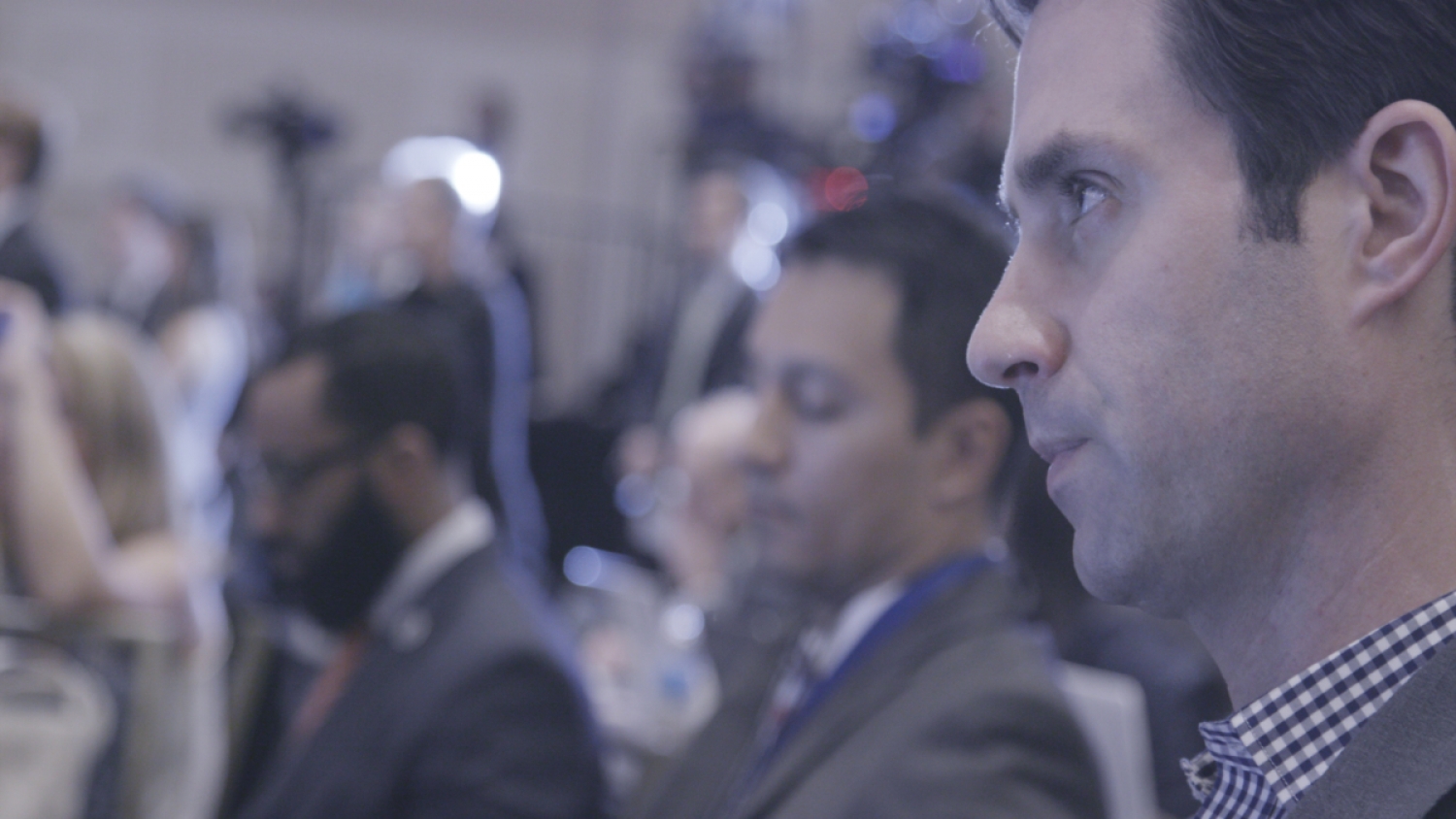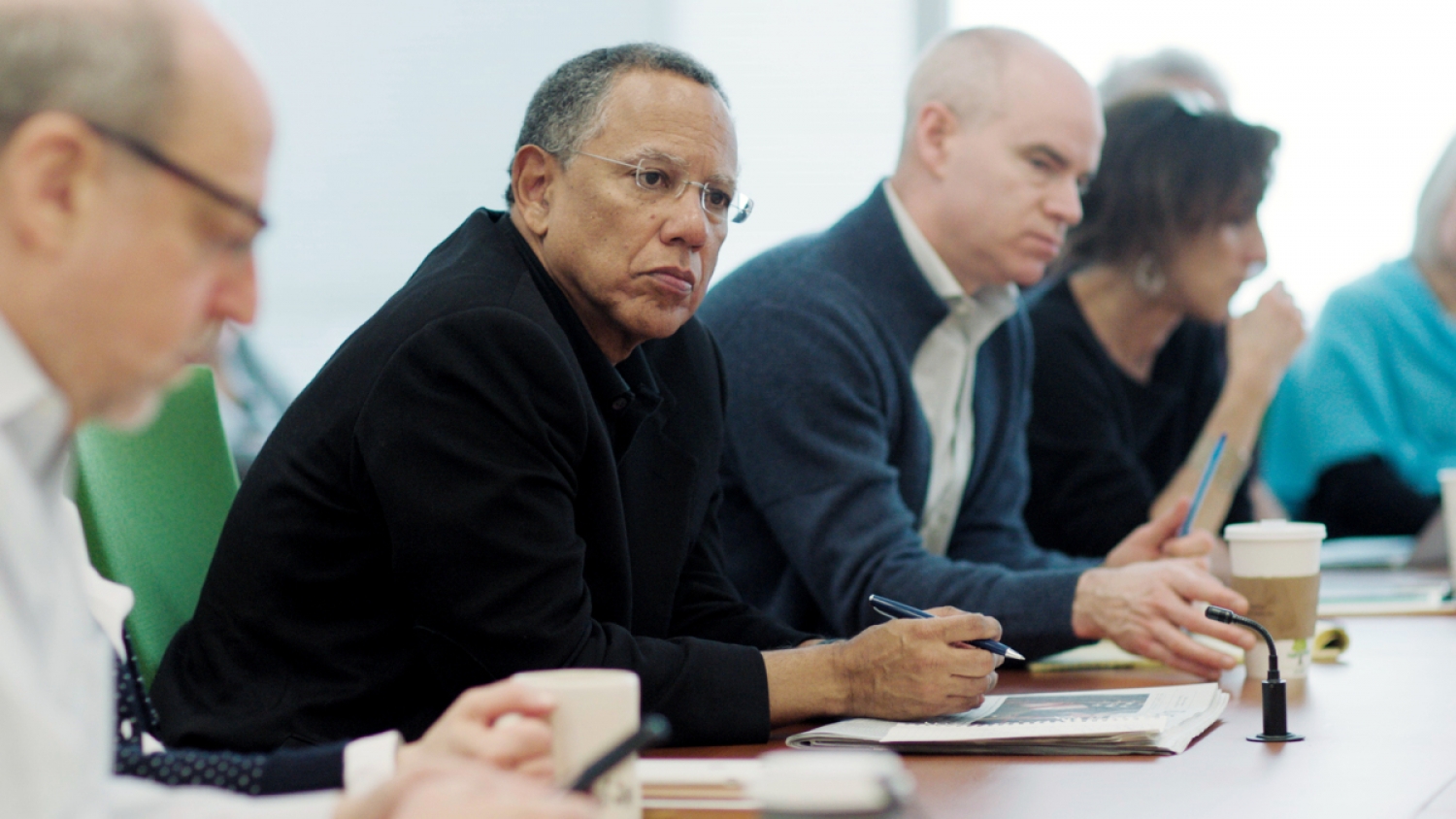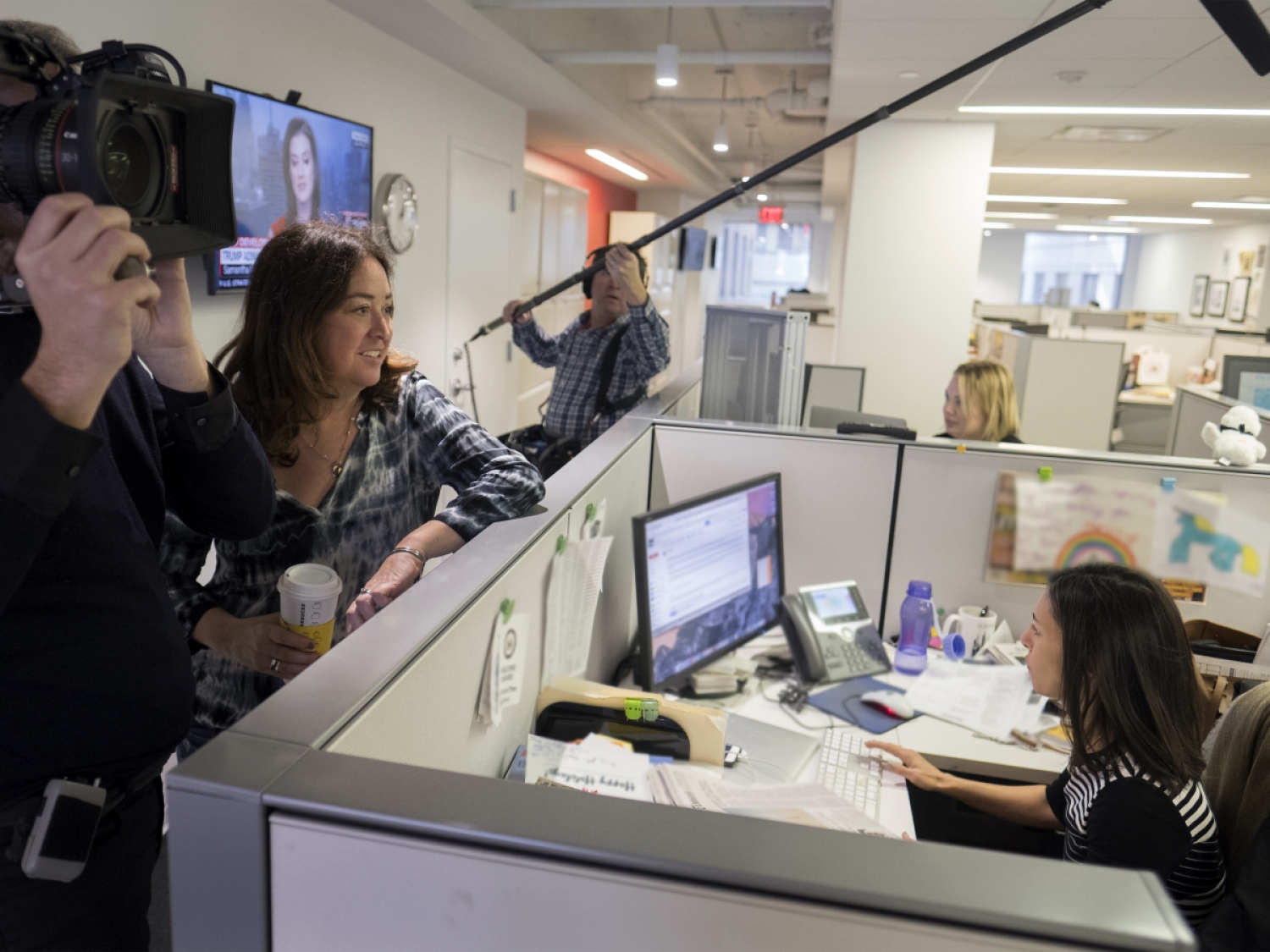The term "the fourth estate" was coined by long-time New York Times columnist William Safire, "to put the press on an equal footing with the greatest power in a nation." In a watchdog era of investigative reporting on a presidency that attacks democratic institutions daily, the exigency of a free press has never been so apparent. In her current Showtime series, The Fourth Estate, veteran documentarian Liz Garbus showcases the inner workings of The New York Times during a year when the "paper of record" is simultaneously at the forefront of multiple explosive investigations and under attack from various quarters. "Trump has unwittingly helped to create a golden era for American journalism," Times reporter Jeremy Peters, who appears in the series, asserts. "People want to know the truth and they feel like they are not getting it from this White House or this president. They seek out information in places like The New York Times, for a fuller picture. It has led to some extraordinary reporting and Trump is a big part of that, whether he likes it or not, or continues to say that we’re fake news and that we fabricate sources, which, I think on some level at least, he knows to be untrue. It quickly became evident that one of the biggest storylines out of this administration was hostilities that they harbor towards the news media and the president’s desire to make us, as he says, "the enemy of the people." That wasn’t something that reporters covering the Obama White House ever had to deal with. Certainly, there was hostility and disagreement, but it was never anything like the demonization and distortion that you see with this White House."
Garbus chronicles a year in the life of the Times and its reporters as they cover an administration that considers itself a target of the newspaper, in a year of apocryphal information. The first episode of the four-part series opens with the 2016 Presidential Inauguration. The White House, overshadowed by dark clouds and imposing shrub, contrasts sharply with the white cubicles and open spaces of The New York Times' headquarters, where Executive Editor Dean Baquet, huddled within an inner circle of his New York reporters, watches the ceremony on a laptop. It is a moment of reckoning—and disbelief on the faces of otherwise stoic reporters. Baquet breathes, "What a story," setting the adrenalin-fueled tone for the rest of the series.
Garbus notes that it was not easy to plan an average day on set. Each day began with the decision of whether or not the crew should head to the Times' offices. "It was a great place to be, as the world seemed to be shifting on a rollercoaster ride with no particular end in sight," Garbus recalls. "It was about making smart decisions about when not to shoot. Sometimes it was just throwing darts at a board. We ended up shooting 150 days. As time went on and we formed relationships with the reporters, we started to get a better sense of when they would be filing the bigger stories that they had been working on. And once we narrowed in on who our characters would be, we used their reporting pace as our guiding principle."
Each reporter, before being filmed, was required to give individual consent. "Some people are very comfortable in front of cameras and they gravitate towards it," Garbus notes. "They're not too distracted by you and it flows easily. For others, it's a real struggle. Some folks were wary. One reporter said to me, 'This film is going to look like Trump versus The New York Times.' But that’s a false construct and that’s not good for The New York Times. Some people were closed to the idea at first, and then as time went on, they decided to participate."
Producer/co-director Jenny Carchman recalls that the team "just kept showing up. There were stressful days when people did not want to be filmed or there was chaos in the White House, and they were trying to understand it. Those were the most exciting days to film, but there were moments in those days, where reporters would have had enough of us. Liz and I decided that the most important thing was for these reporters to be able to do their jobs. Filming was just as important to us, but not to them. We had to respect that because we were guests in their house. We couldn’t go in and pretend we owned the place or leave coffee cups everywhere. We had to always remember that we didn’t work at the Times. Slowly, we began having off-camera conversations with the reporters. They would ask us questions like, 'What are you guys doing? What is this going to be? Who else are you filming with?'"
For the documentarian, access is a product of trust. The Fourth Estate showcases the lives of the Times reporters, including their homes and children and the struggles of working a nonstop news cycle. "We wanted as much personal access as we could get," says Garbus. "For some reporters, it was a matter of personal safety to not include their home life. For others, it didn't seem important. It was each person's personal decision and something that you negotiate on set and on site, as opposed to having a protocol. With a protocol, it's always going to be more restrictive. You want to keep asking, keep pushing, rather than establish protocol." The series follows White House reporter Maggie Haberman, who has covered Trump for decades. She is also the mother of three. In one scene, she breaks away from a podcast recording to console one of her children, who has called her in tears. This scene captures a humanizing moment and underscores the toll that covering the Trump presidency can take on the life-work balance. "We didn’t ask to go into people’s homes right away," Carchman says. "It took several months to ask if we could go and see them outside of their office. They were resistant at first. But after we filmed at home with one person, the rest followed. They're a competitive bunch of people, so if one of them is doing it, maybe the others want to do it too."
Peters allowed the filmmakers into his home. "It was awkward; I’m not going to lie," he admits. "We had a camera at our home at 6:30 in the morning. I'm used to it, but my partner was not. He was quite unsure of how to act around a camera, a microphone and a producer while getting ready to go to work. It took some getting used to because as much as reporters like to put people on the spot with our questions, we're certainly not used to having the microphone turned on us. I think at first we were naturally most nervous about how we were going to be portrayed, since much of our work is usually done almost completely out of the public view. Ultimately, I think everyone involved in the project came to appreciate that Liz and her crew just wanted to see how we do our jobs in the face of this extraordinary hostility from a White House that is really unprecedented in modern times."

Peters covers the Republican party for the Times, a job that can attract more than its fair share of hostility. In the series, at a rally in Phoenix, Trump singles out the media as "fake news." Republican followers hurl threats and as the speech ends, Times reporter Mark Landler hurries out of the room. "Being a reporter for The New York Times and covering Republicans is never as bad as people suspect," Peters maintains. "Once you engage with your subjects, regardless of their political beliefs and their pre-conceived notions about your political beliefs, that wall comes down. They see that I'm just a curious guy who's trying to do his job and that job is to find out why they believe and vote the way they do." During filming, Peters drew no boundaries for Garbus and Carchman. "Knowing them personally went a long way," he notes. "I think at one point at home, I asked that they not film a personal photograph of ours, but that was really it. I invited them into my house to see everything. Asking questions and having a sense of the storylines that were coming to life over the course of the year made us realize that this wasn't going to be something that we would have to worry about in terms of mischaracterizing our work. There were times when I was trying to finish a story or I was at the end of a long day and had been with a camera for most of it and had had enough of it. By and large, it was a relatively un-cumbersome process."
The Times gave Garbus, one specific guideline: do not expose any confidential sources. Having a constant crew around was not always easy for the investigative journalists. "From the beginning, Liz let us know that if we said things that couldn't be filmed, and didn’t want them used, she wasn’t going to use them," Peters explains. "She always seemed like an honest broker, so I don't think anybody was worried for long." Building this trust meant an awareness of the consequences that came with exposing a source. "If we were in the middle of shooting a meeting and somebody had said a name or even the gender of a pronoun, we deleted that media on site," Garbus recalls. "If there was anything on the memory card that could cause someone to go to jail or lose their job, then I didn't want to carry that media around. Part of the reason to delete it on site is to ensure that it doesn't exist or go into the system where a number of people might have access to it after we brought it home from the field. I wanted to leave no trace of it. But it's also possible that you could film somebody talking about a source or two without us or them realizing it. The Times did have a final review to make sure that we didn't reveal any confidential sources. I certainly consulted heavily with lawyers about having other protocols I should explore, but this was the major one. It will be interesting to see how this comes under attack, or if it does come under attack once the show is out."
When Garbus pitched her desire to be a fly-on-the-wall for the year, Times Executive Editor Baquet was immediately responsive. "Dean is someone who has an impulse towards transparency," Garbus maintains. "And he was predisposed to be comfortable with my pitch. I think that he felt somewhat comfortable with that level of vulnerabilities. I think he also saw the writing on the wall. He saw that the Times and other organizations were going to be attacked day and night, that they were going to be painted as the resistance or the left trying to take down a president. And he knew what his reporters were like and they're not the resistance sitting there trying to think about stories that are going to end Trump’s presidency. They're driven by being first responders and finding great stories, and often they have hurt Democrats too. I think he felt that if we show how the sausage is made, people will understand the kind of sausage it is."

Garbus emphasizes that alongside access, filming The Fourth Estate came with editorial independence. Aside from legal review, The New York Times saw the series at an early screening at Showtime. "We were not a production of The New York Times," Garbus asserts. "This was made like every other documentary I've made, where I shot footage, took it home and edited it. There was no creative partnership there or censoring from The New York Times. I can state that unequivocally." The documentarian goes on to explain her own choices in shaping The Fourth Estate. "In making decisions about what to include and what not to include in the edit, I am thoughtful about not taking cheap shots. I wouldn't call it censoring. I was also thoughtful about that with What Happened, Miss Simone?. When I interviewed people about Nina Simone, I heard some crazily salacious stories about a period in her life in which she was mentally decompensating. I didn't think it was interesting or important to include that. For me it was enough to have empathy for a woman who was mentally decompensating, without hearing that she had urinated on herself. For people who love and enjoy her music, that would be disturbing. In other words, as a filmmaker, I do make decisions to not include gratuitous stuff about my subjects. But when you have to ask someone hard questions like, 'Did you guys make some mistakes in the 2016 campaign? Did you guys not understand the Russia story early enough?'— questions that are not cheap shots, but real and important—those need to be asked."
Russia emerges quickly as a dominant theme of the show. It is a specific choice in a moment when the Times was uncovering multiple stories. "Our parameters were to film for a year," Carchman explains. "And since our focus was Trump, the stories were all coming out of Washington. The Russia story is a long, drawn-out, multi-tiered, multi-tangent story. It was the thread that we hung onto, to have consistent characters through the episodes and a story that you could continue to follow. It's also the most competitive story of our time right now, and we had reporters who were breaking the news in that story. It was probably midway through the year when we were assessing what our through lines were, when it became clear that [the Russia story] was not going to end. We realized that it was the piece that was going to tie all these characters and this topic, together."
The Fourth Estate is also the story of a newspaper in financial crisis, at a time when the medium is under attack. This underlying second thread developed early. "The whole dynamic of a free press being attacked by the executive branch was the inspiration for the film," Garbus maintains. "That was always the lens by which I was looking at it. Then, when the show began to come together, I reached out to a friend who is a writer with The New York Times Magazine. As I was talking to him about that dynamic between the president and the press, he pointed out that all of this was happening in a moment where the Times is facing a kind of existential crises. All the newspapers have been bought by big corporations and The Washington Post is with [Amazon founder] Jeff Bezos. And the Times was trying to reinvent itself for a digital age. Right from the beginning, I had the insight of somebody from the inside who was telling me about internal conversations that were happening."
For fly-on-the-wall coverage, small crews are essential. Carchman and Garbus had a central team of four and they divided their time between the Washington and New York bureaus. "We had a DP, a sound person, and Liz or me," says Carchman. "In New York, we had one field producer who would travel with reporters when they went on trips or overseas. Liz and I decided that we needed to be the main people because it was hard to gain trust. Over time, we became the people who knew how to manage the various personalities and understood when to film. The Washington office was very small, so it was hard to be invisible while we were there, but it was necessary. We didn’t trust anybody else to go in, in case it ruined our access."

As to whether The Fourth Estate was always conceived as a series, "We were going to make a film," Carchman asserts. "That was the very first conversation I ever had with Liz, in December 2016. And then a week later, it turned into a series before we even started filming. That happened because of the scope of the project and the length of time and wondering, How in the world we were going to show it all in 90 minutes, if we were giving ourselves this boundary of a year? You can't cover all of this in a feature. The series was the right way to go."
The series employs an almost thriller-like tone and pace in its creative choices. Carchman ascribes this to the perpetual urgency in the air, which transferred to the documentarians. In one scene, shortly after posting the news of [White House Chief of Staff] Reince Priebus' firing, Haberman answers a call and says, "Are you just calling to say, Holy shit, can you believe this isn't just an episode of House of Cards?"
"It was very tense being at the Times," Carchman admits. "And that was something that we talked about with our composer early on—what it felt like to be in the office. There's a constant underlying feeling that something could happen any minute and you have to be at the ready. It requires you to check your phone a billion times a day. It's this feeling that things are not steady and things are chaotic. The decision to incorporate that into the music felt so right and true to the feeling of being there. I was incredibly relieved when we finished shooting. Even if it was just an hour, it always felt like being inside the office was really hard because the pressure was really on."
The Fourth Estate will certainly inherit the audience of The New York Times. The question is, Who else will be watching? "The Times subscribers are people are obsessed with the news, obsessed with the story of President Trump," Carchman notes. "They want to see the people who are delivering their news as human beings, and so they want to have a little more insight into who those people are. But the hope is that people who don't necessarily read the Times, people who might be on the more right-leaning side of the political spectrum, will also watch." For Peters and the Times reporters, it is an effort towards transparency, and a reprieve. "I hope it's people who aren’t as familiar with our work and the tremendous amount of time and energy and sweat that goes into producing The New York Times every day," says Peters. "I hope that it peels back the curtain for those people who maybe thought a certain way about the way we approach our jobs. And they'll see this and realize that it is very different."
The news cycle has become a devouring force and most consumers experience it in a far less active capacity than a Times reporter. The recap of a year of upheaval and change through the powerful, active role of good journalism provides almost a vicarious empowerment for its audience. In this past year, of the things that have mattered, that will go down in history with honor, the work of these journalists is certainly among them. That is thrilling to watch. There is room in the television universe to watch that across newsrooms, across political spectrums. As Carchman puts it, "There's a piece of addiction in this. These reporters really can't pull themselves away from the news. It's also a comforting place to be. As a filmmaker, I felt incredibly comforted being inside this organization, watching them. I felt like whatever was happening out in the world didn’t affect me in that moment because I was doing my job."
It is also fun and enlightening to watch the Times reporters in action and get to know their human sides. What The Fourth Estate is not is an unvarnished look at the line of defense and change within a team that has been under attack, financially and politically. One wonders what the real plan is, in combating the hatred directed at media or whether there are shifts in policy and guard that will strengthen the gates of an age-old institution, at a time of such focused expansion into new media. One wonders how these journalists really feel about being under attack.
The role of the journalist is clear, in the current socio-political landscape, and The Fourth Estate is testimony to that. But Garbus and Carchman also bring to the forefront the role of the documentarian. As chroniclers of the story of the moment, documentarians are delivering the visual record, at a perilous time for fact. To make compelling entertainment that speaks truth to power is vital to the current time.
Episodes 3 and 4 of The Fourth Estate premiere on June 10 and 17 on Showtime; the entire series is currently streaming on www.sho.com.
Nayantara Roy is a writer and producer based in Los Angeles. During the day, she works in unscripted development at AGBO Studios.

